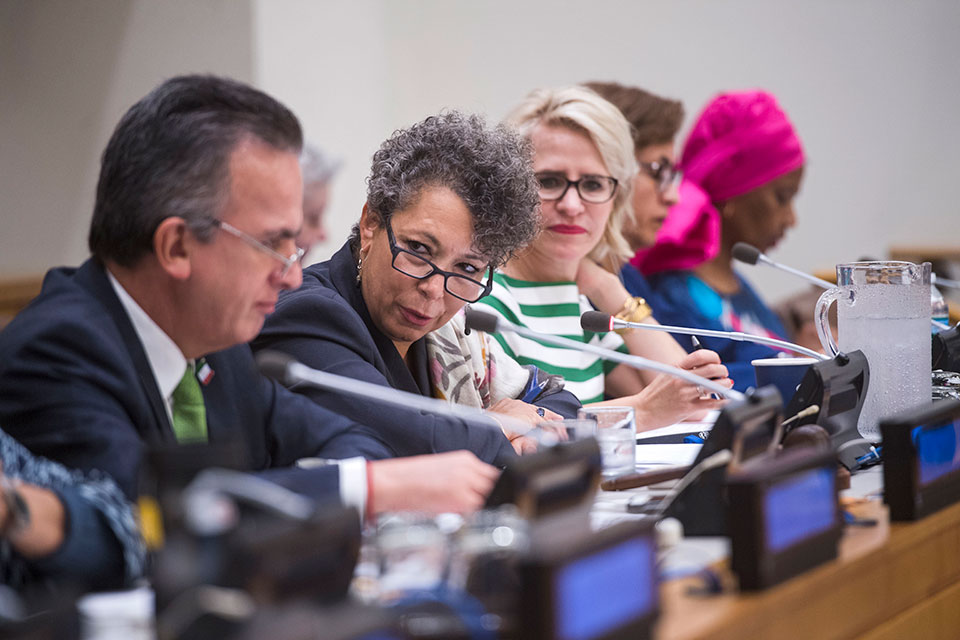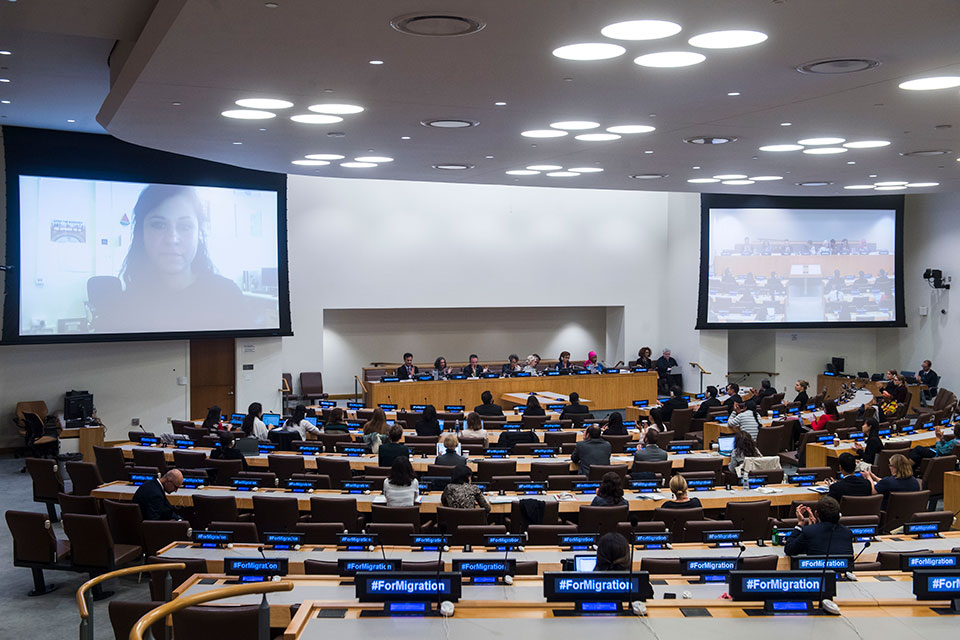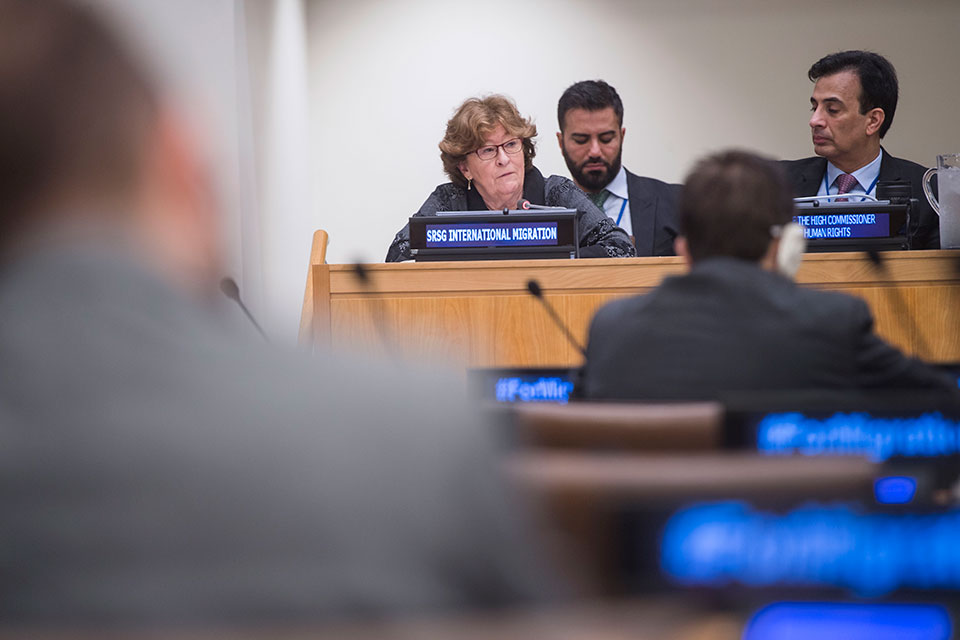Event coverage: Towards an international agreement on migration policies that work for women
Date:

Women represent half of the estimated 258 million international migrants, and their experiences are complex and diverse. While migration offers an array of opportunities and empowerment for women and their families, discriminatory practices create unjust and harmful obstacles and barriers to safe and legal channels for migration.
On Friday, 28 September, during the high-level week of the 73rd UN General Assembly in New York, a side event on “Promoting Gender-Responsive Migration Governance through the Global Compact for Migration” discussed the importance of human rights-based and gender-responsive implementation of the Global Compact for Migration.
Women migrants are leaders in their own rights. — @phumzileunwomen #ForMigration #UNGA pic.twitter.com/pwRC4S5PbL
— UN Women (@UN_Women) September 28, 2018
“For us, the Global Compact is about tearing down [the] walls, both literal and metaphorical, and replacing them with this bridge that is more about cooperation, evidence-based policy, and human rights,” said Craig Mokhiber, Director of Office of the High Commissioner for Human Rights (OHCHR), New York Office.
The event, organized by the Permanent Missions of Ecuador, Liechtenstein and Mexico, the International Organization for Migration, OHCHR and UN Women, outlined the roles that all stakeholders, including governments, civil society organizations and the UN system, will play in implementing the Global Compact for Migration, to be adopted at an intergovernmental conference in December 2018.

The Global Compact is the first intergovernmentally negotiated agreement on all dimensions of international migration. Its framework is rooted in the 2030 Agenda for Sustainable Development and the Addis Ababa Action Agenda, and enshrines gender-responsive, human rights based and child-sensitive approaches to international migration policy. It is set to respond to the real life needs and challenges of migrant women and men.
“The Global Compact for Migration is a milestone for the United Nations. It is the first internationally agreed set of commitments to ensure that migration can be safe, orderly and regular for all,” said Phumzile Mlambo-Ngcuka, Under-Secretary General of the United Nations and Executive Director of UN Women, on the significance of the Global Compact.
Gladys Acosta Vargas, Member of the Committee on the Elimination of Discrimination against Women (CEDAW), stressed the importance of ensuring that the Global Compact responds to the lived realities of the millions of migrant women and girls around the world and outlined three key challenges: legal protection, fair rules of reception, and access to justice.
Elaborating on fair reception policies, Ms. Vargas said: “There is an urgent need for a specific measure to regularize irregular migration and to prohibit family separation. The separation of young women and girls from their families poses particular risks to them as they may be exposed to sexual exploitation and abuse, including trafficking, as they lack family protection."
In her remarks, Ms. Mlambo-Ngcuka also called for the elimination of unacceptable practices such as detention of migrants and separation of children from families and shared several points from UN Women’s expert recommendations on addressing women’s human rights in the Global Compact. In addition to women having the right to autonomous movement without permission from a male spouse or relative, non-discriminative visa and permit options are essential to ensure gender-responsive migration governance. “States must also provide migrant women, particularly those with irregular migration status, with access to essential services, including support for women with disabilities,” she added.

Throughout the moderated discussion, panellists put forth best practices, including legal reforms and institutional arrangements, which have led to more gender-responsive migration governance in various countries, including in Mexico, where they have started a story-telling initiative which collects and shares personal stories of migrant women. To date over 400 women have participated and these stories are helping to reduce stigma and discrimination against migrant women.
In his remarks, Craig Mokhiber of OHCHR underlined the importance of recognizing migrant women’s and girls’ vulnerability as a product of systemic discrimination, rather than an innate condition: “The Global Compact rightly recognizes that women and girls are not inherently vulnerable, as we’ve heard from others, but rather that they find themselves in vulnerable situations as a result of multiple and intersecting forms of discrimination and inequality.”
Many women migrants face vulnerabilities as domestic workers. #ForMigration #UNGA pic.twitter.com/j1QeR79DAf
— UN Women (@UN_Women) September 28, 2018
Lucila Granada, Director of the Latin American Women's Rights Service (LAWRS) and member of the Women in Migration Network, spoke about the importance of access to information about rights, legal information, abuse reporting, justice, regular immigration pathways and specialist advice on emotional support for migrant woman. She shared the experience of a woman who utilized LAWRS services to leave an abusive relationship while navigating the complexities of her migration status. “Seeking help should not be more dangerous than staying with a perpetrator of violence, for anyone,” stated Ms. Granada.
In closing remarks, Aurelia Frick, Foreign Minister of Liechtenstein, emphasized that the Global Compact and its gender-sensitive implementation is owed to migrant women in order to maximize opportunities for them: “We should give a platform to the many strong women that write the stories of their families by setting up new livelihoods, realizing their dreams, often with a great sacrifice.”